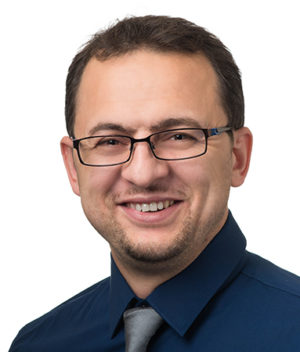LA JOLLA, CA—Computational Biologist Dr. Ferhat Ay has joined the La Jolla Institute for Immunology as Institute Leadership Assistant Professor of Computational Biology in the Division of Vaccine Discovery, the Institute announced today.
“Although Ferhat is still in the early stages of his independent research career, he has already demonstrated the originality and audacity that signal exceptional scientific talent,” says Mitch Kronenberg, Ph.D., president and chief scientific officer of the La Jolla Institute. “Without questions, his special scientific expertise and pioneering spirit will help catalyze the kind of trailblazing discoveries that deepen our insight into the elemental processes behind health and disease and pave the way for novel therapies. We are delighted to welcome him to the Institute.”
Dr. Ay uses his expertise in algorithms, graph theory, data mining and machine learning to search for answers to complex questions in biology. He is particularly interested in understanding the relationship between genome architecture and the regulation of gene activity in the malaria parasite Plasmodium falciparum as well as related issues concerning genome architecture in different organisms and in human cells, such as breast cancer and leukemia cells. If the DNA in the genome of each of our cells were completely linear or straight, it would stretch for several feet. To fit the genome into the nucleus and keep things neatly organized the DNA is highly coiled and packed into chromosomes. In recent years, this three-dimensional architecture of the genome within the cell’s nucleus has been recognized as an important but poorly understood control mechanism of genome function.

Born and raised in Turkey, Dr. Ay received a dual B.S. in computer engineering and mathematics from the Middle East Technical University in Ankara, Turkey. As part of his doctoral thesis at the University of Florida in Gainesville, he developed efficient algorithms to comparatively analyze genome-wide networks that govern metabolic activity and gene regulation in multiple organisms including the fruit fly D. melanogaster. His studies revealed that the fruit fly genome regulates its genes in a transcriptional hierarchy with extensive post-transcriptional feedback.
In recognition of his graduate work, which had revealed novel and unexpected topological patterns and relationships between different metabolic and gene regulatory networks, Dr. Ay was named- Computing Innovation Fellow by the Computing Research Association. This extremely competitive fellowship matched him with Dr. William Noble’s laboratory in the Department of Genome Sciences at the University of Washington, Seattle, where he turned his attention to the influence of the genome’s three-dimensional architecture on gene activity.
His trailblazing work provided the first evidence that the 3D configuration of DNA in the nucleus acts as a major gene regulatory mechanism in the most lethal form of malaria, Plasmodium falciparum. By providing fundamental insight into the regulatory mechanisms controlling the infectious cycle of Plasmodium, he paved the way for the development of novel lines of defense against malaria.
Before joining the La Jolla Institute as an Assistant Professor of Computational Biology, Ay worked as a Research Assistant Professor in the Department of Preventive Medicine-Health and Biomedical Informatics at Northwestern University in Chicago, IL.
About La Jolla Institute for Immunology
The La Jolla Institute for Immunology is dedicated to understanding the intricacies and power of the immune system so that we may apply that knowledge to promote human health and prevent a wide range of diseases. Since its founding in 1988 as an independent, nonprofit research organization, the Institute has made numerous advances leading toward its goal: life without disease.


